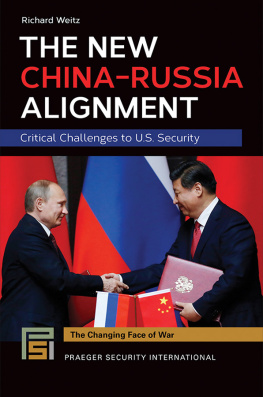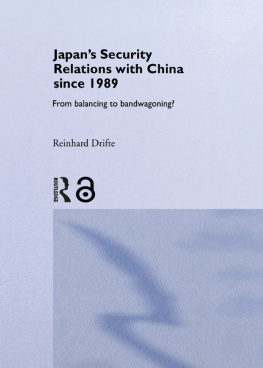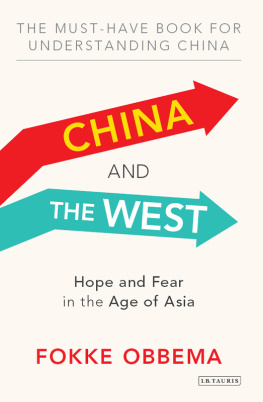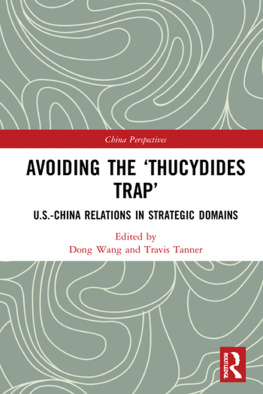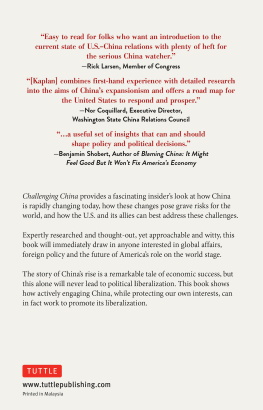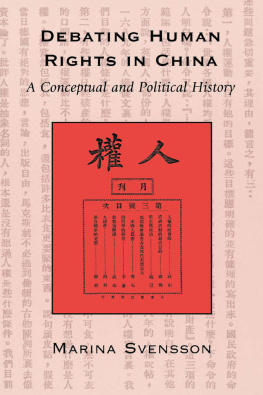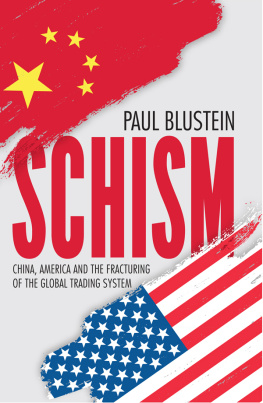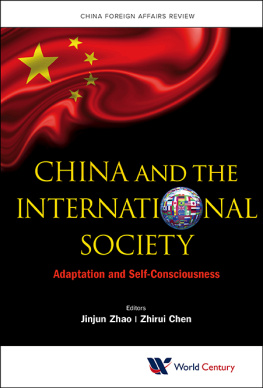DEBATING CHINA

DEBATING CHINA

THE U.S.CHINA RELATIONSHIP IN TEN CONVERSATIONS
NINA HACHIGIAN
EDITOR


Oxford University Press is a department of the University of Oxford.
It furthers the Universitys objective of excellence in research, scholarship,
and education by publishing worldwide.
Oxford New York
Auckland Cape Town Dar es Salaam Hong Kong Karachi
Kuala Lumpur Madrid Melbourne Mexico City Nairobi
New Delhi Shanghai Taipei Toronto
With offices in
Argentina Austria Brazil Chile Czech Republic France Greece
Guatemala Hungary Italy Japan Poland Portugal Singapore
South Korea Switzerland Thailand Turkey Ukraine Vietnam
Oxford is a registered trademark of Oxford University Press
in the UK and certain other countries.
Published in the United States of America by
Oxford University Press
198 Madison Avenue, New York, NY 10016
Oxford University Press 2014
All rights reserved. No part of this publication may be reproduced, stored in a
retrieval system, or transmitted, in any form or by any means, without the prior
permission in writing of Oxford University Press, or as expressly permitted by law,
by license, or under terms agreed with the appropriate reproduction rights organization.
Inquiries concerning reproduction outside the scope of the above should be sent to the
Rights Department, Oxford University Press, at the address above.
You must not circulate this work in any other form
and you must impose this same condition on any acquirer.
Library of Congress Cataloging-in-Publication Data
Debating China; the U.S.China relationship in ten conversations / edited by Nina Hachigian.
pages cm.
Summary: Experts from the U.S. and China engage in letter exchanges that illuminate the multidimensional
and complex relationship between the two countries.Provided by publisher.
ISBN 9780199973873 (hardback)ISBN 9780199973880 (paperback)
1. United StatesForeign relationsChina.
2. ChinaForeign relationsUnited States. I. Hachigian, Nina,
editor of compilation.
E183.8.C5D426 2014
327.73051dc23
2013023099
1 3 5 7 9 8 6 4 2
Printed in the United States of America
on acid-free paper
For my mother and father,
who were always the wind at my back
CONTENTS
1
AN OVERVIEW OF THE U.S.CHINA RELATIONSHIP
Kenneth Lieberthal & Wang Jisi
2
THE ECONOMIC RELATIONSHIP
Barry Naughton & Yao Yang
3
POLITICAL SYSTEMS, RIGHTS, AND VALUES
Zhou Qi & Andrew J. Nathan
4
THE MEDIA
Wang Shuo & Susan Shirk
5
GLOBAL ROLES AND RESPONSIBILITIES
Yuan Peng & Nina Hachigian
6
CLIMATE AND CLEAN ENERGY
Kelly Sims Gallagher & Qi Ye
7
GLOBAL DEVELOPMENT AND INVESTMENT
Elizabeth Economy & Zha Daojiong
8
MILITARY DEVELOPMENTS
Christopher P. Twomey & Xu Hui
9
TAIWAN AND TIBET
Jia Qingguo & Alan D. Romberg
10
REGIONAL SECURITY ROLES AND CHALLENGES
Wu Xinbo & Michael Green
James B. Steinberg
The outstanding experts who contributed to this volume have my sincere gratitude. This book would not exist without them, and they impressed me repeatedly with their insights and convictions. That they were willing to take a gamble on an experimental approach is a testament to their open-mindedness. It was my privilege to work with such a stellar group.
I am very grateful to my fine colleagues at the Center for American Progress, especially Rudy DeLeon and Melanie Hart, for their support of this project as well as their general excellence and good cheer.
A few others deserve special thanks. The Luce Foundation provided critical financial support. Elizabeth Steffey first planted the notion of expanding an earlier published exchange into a book, and Jeff Wasserstrom pointed me in the right direction with my plan. Rebecca Friendly was an invaluable help with editing and organizing. Robert Kapp went beyond his call of duty as a translator, and Ken Sofer, Yao Lei, Philip Ballentine, and Luke Herman provided able research assistance. Greyson Bryan, Michael Schiffer, David Shorr, and Peter Scoblics editorial input was enormously helpful. I am grateful to Jim Steinberg, whose views on foreign policy have consistently informed mine, for writing the conclusion.
My agent Andrew Wylie made it happen, and I want to thank David McBride and his team at Oxford University Press for embracing a new idea and then working hard to realize it.
I owe everything to my incredible parents who never failed to support me in every way. My brother Garos common sense advice hit the mark. My wonderful children inspire me so much. And Joe Day, my husband, always had incisive feedback and encouraging words when I needed them most.
NINA HACHIGIAN
On a wintry day in 2009, when new snowfall blanketed the grounds of a government-sponsored research center in Beijing, I had a lively exchange with an influential Chinese security expert, Dr. Yuan Peng. He and I debated the respective roles of America and China in global affairs at a small conference, along with other academics and former government officials. While our conclusions were radically different, we shared an understanding of the important questions to ask and a genuine desire to make the other understand why we held our point of view. Afterward, we published a version of our dialogue in the British foreign policy journal Survival. Later, a colleague suggested that our back-and-forth would make for a good book, and here we are.
The United States and China have the worlds two largest economies and military budgets. They lead the globe in Internet users and greenhouse gas emissions. They are the biggest traders, investors in R&D, and consumers of multiple commodities. Both are nuclear powers and permanent members of the United Nations (UN) Security Council.
No bilateral relationship is more important to the future of humanity. How America and China choose to cooperate and compete affects billions of lives. We need to understand better how each side views the promise and perils of their relationship because steady, clear-eyed, workaday bonds can be a force for global stability and prosperity while intermittent, fear-based, and confrontational ties will lead to a darker future.
This volume offers a portrait of U.S.China relations in ten conversations. In the chapters that follow, a Chinese and an American policy expert discuss the rich dynamics around a facet of the Sino-American relationship, writing letters back and forth. All are titans in their fields, highly respected in academia and policy circles, and many have played important formal and informal roles in steering bilateral relations. They converse regularly with their counterparts abroad, but rarely does the public get to listen in on these conversations.
You will now have that chance. I paired the experts on nine critical topics and offered them a series of questions (printed at the front of each chapter) to guide their dialogueson economics, human rights, media, global roles, climate and energy, development, military affairs, Taiwan, and regional security. These represent the major issues, but Chinese and Americans interact on a growing list of policy questions. As Kenneth Lieberthal and Wang Jisi discuss in their overview, the relationship is expanding.
Next page


